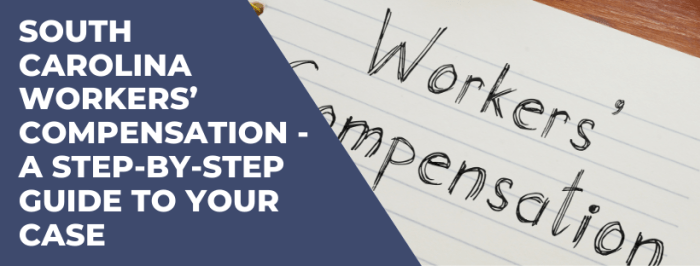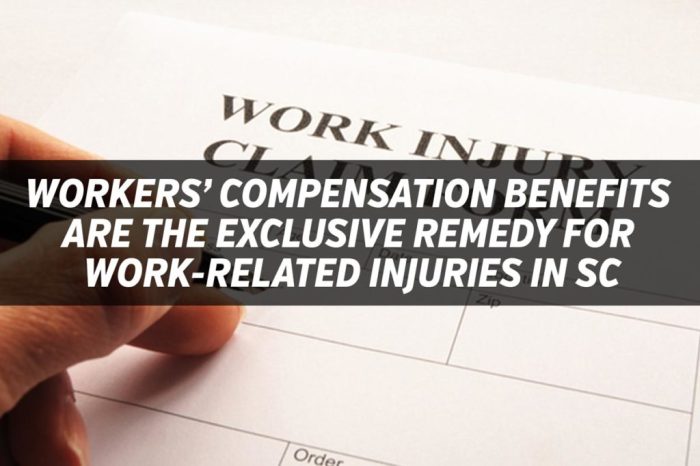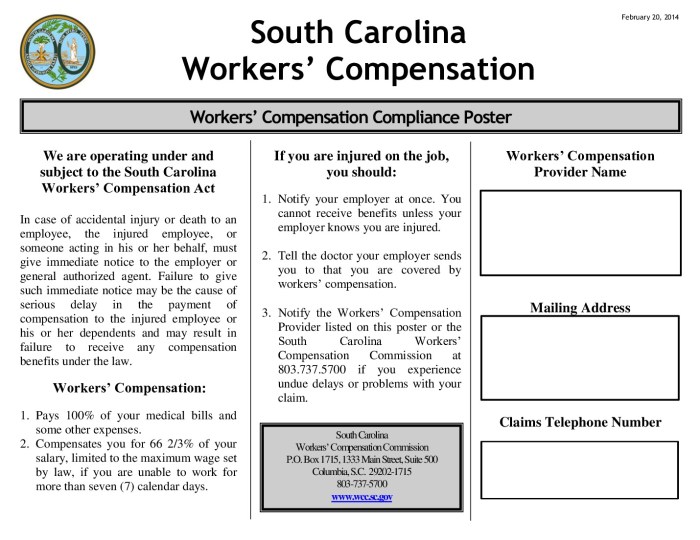South carolina workmans comp insurance – Navigating the complexities of workers’ compensation insurance in South Carolina can be challenging. This comprehensive guide aims to provide a clear and detailed understanding of the system, its requirements, and the rights and responsibilities of both employers and employees. We will cover key aspects, including eligibility, benefits, claims processes, and common FAQs, ensuring you have the information needed to navigate this crucial area of employment law.
Understanding South Carolina Workers’ Compensation
South Carolina’s workers’ compensation system is designed to protect employees injured on the job. It provides medical benefits and wage replacement to workers who suffer work-related injuries or illnesses, regardless of fault. This “no-fault” system means that an injured worker can receive benefits even if their employer wasn’t negligent. The system aims to ensure prompt and fair compensation for injured workers while also providing employers with a predictable system for managing workplace injuries.

Source: theclardylawfirm.com
Who is Covered by South Carolina Workers’ Compensation?, South carolina workmans comp insurance
Most employers in South Carolina are required to carry workers’ compensation insurance. This typically includes businesses with one or more employees. However, there are some exceptions, such as certain agricultural employers and independent contractors. The specific requirements depend on the nature of the business and the number of employees. It’s crucial to check with the South Carolina Department of Insurance to confirm your coverage obligations.
Types of Injuries Covered
South Carolina workers’ compensation covers a wide range of work-related injuries and illnesses. This includes:
- Physical injuries: Fractures, sprains, strains, burns, cuts, and other physical traumas.
- Occupational diseases: Illnesses caused or aggravated by the work environment, such as asbestos-related diseases, carpal tunnel syndrome, and hearing loss.
- Mental health conditions: In certain circumstances, mental health conditions stemming from workplace stress or trauma may be covered.
It’s important to note that the coverage extends to injuries that occur during the course and scope of employment. This means the injury must have happened while the employee was performing their job duties.
The Claims Process in South Carolina
Filing a workers’ compensation claim in South Carolina involves several steps:

Source: greenvillelegal.com
Reporting the Injury
Immediately report any work-related injury or illness to your employer. This is crucial for initiating the claims process. Many employers have specific procedures for reporting injuries, so follow your company’s protocol.
Seeking Medical Treatment
Seek medical attention promptly. Your employer’s workers’ compensation insurance carrier may have a network of preferred providers. It’s advisable to utilize these providers to ensure smooth processing of your medical bills.
Filing the Claim
Your employer is responsible for filing the initial workers’ compensation claim with the insurance carrier. They will provide you with the necessary forms and assistance.
Reviewing the Claim
The insurance carrier will review your claim and determine your eligibility for benefits. This may involve medical evaluations and investigations to verify the nature and cause of your injury.
Appealing a Denied Claim
If your claim is denied, you have the right to appeal the decision. The appeals process involves specific procedures and timelines, and it’s advisable to seek legal counsel if your claim is denied.
Benefits Provided Under South Carolina Workers’ Compensation
Workers’ compensation benefits in South Carolina typically include:

Source: laborposters.org
- Medical benefits: Coverage for all reasonable and necessary medical expenses related to the work injury, including doctor visits, hospital stays, surgery, physical therapy, and prescription medications.
- Wage replacement benefits: A percentage of your average weekly wage, typically two-thirds, while you are unable to work due to your injury. There are limitations on the duration of these benefits.
- Vocational rehabilitation: Assistance with retraining or job placement if your injury prevents you from returning to your previous job.
Common Questions and Answers (FAQs)
- Q: What if my employer doesn’t have workers’ compensation insurance? A: If your employer is required to have workers’ compensation insurance and fails to do so, you may have legal recourse to pursue benefits directly from your employer. Consult with an attorney specializing in workers’ compensation law.
- Q: How long does the claims process take? A: The timeline for a workers’ compensation claim varies depending on the complexity of the case. It can range from a few weeks to several months.
- Q: What happens if I return to work before fully recovering? A: You can return to work at a modified duty position, if available, while still receiving some benefits. This should be discussed with your doctor and your employer.
- Q: Can I choose my own doctor? A: While your employer’s insurance carrier may have a network of preferred providers, you generally have the right to choose your own doctor, but there might be limitations on coverage for care outside the network.
- Q: What if my injury is a result of my own negligence? A: South Carolina’s workers’ compensation system is a no-fault system. Even if your injury was partially your fault, you can still be eligible for benefits, unless your actions were intentional or grossly negligent.
Key Terms and Definitions
- Workers’ Compensation Insurance: Insurance that covers medical expenses and lost wages for employees injured on the job.
- Employer’s Liability Insurance: Insurance that protects employers from lawsuits related to workplace injuries.
- Average Weekly Wage (AWW): The average amount you earned per week before your injury, used to calculate wage replacement benefits.
- Lost Wages: The difference between your pre-injury earnings and your post-injury earnings.
- Medical Benefits: Coverage for medical expenses related to the work injury.
Resources
- South Carolina Department of Insurance: [Insert Link to SC Department of Insurance Website]
- South Carolina Workers’ Compensation Commission: [Insert Link to SC Workers’ Compensation Commission Website]
Conclusion
Understanding South Carolina workers’ compensation is crucial for both employers and employees. This guide provides a comprehensive overview, but individual situations can be complex. For specific legal advice or assistance with a claim, it’s always recommended to consult with a qualified attorney specializing in South Carolina workers’ compensation law.
Call to Action
Need help navigating the South Carolina workers’ compensation system? Contact a qualified workers’ compensation attorney today for a consultation. Don’t face this alone – get the legal support you deserve.
Detailed FAQs: South Carolina Workmans Comp Insurance
What if my employer refuses to file a worker’s compensation claim?
Contact the South Carolina Workers’ Compensation Commission directly. They can assist you in filing a claim and investigating your employer’s refusal.
How long does the claims process typically take?
The timeframe varies greatly depending on the complexity of the case. Simple claims may be resolved quickly, while more complex ones can take several months or even longer.
What types of medical treatment are covered under worker’s compensation?
Generally, medically necessary treatment related to the work injury is covered. This includes doctor visits, surgery, physical therapy, and medication.
Am I entitled to lost wages if I can’t work due to my injury?
Yes, worker’s compensation typically covers a portion of your lost wages while you are unable to work due to your work-related injury.
